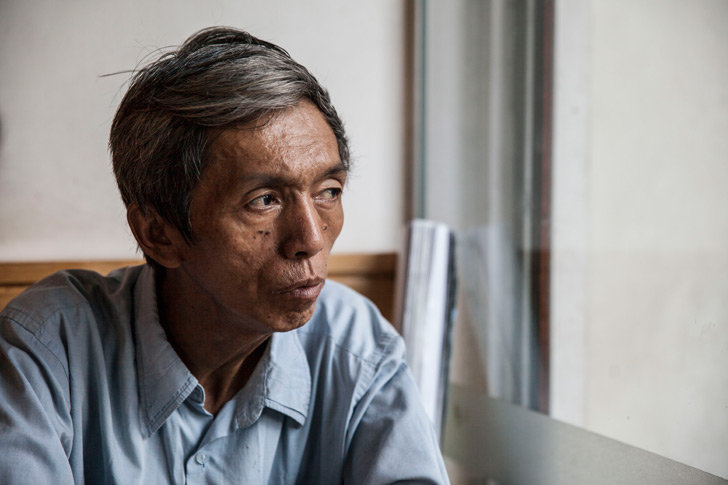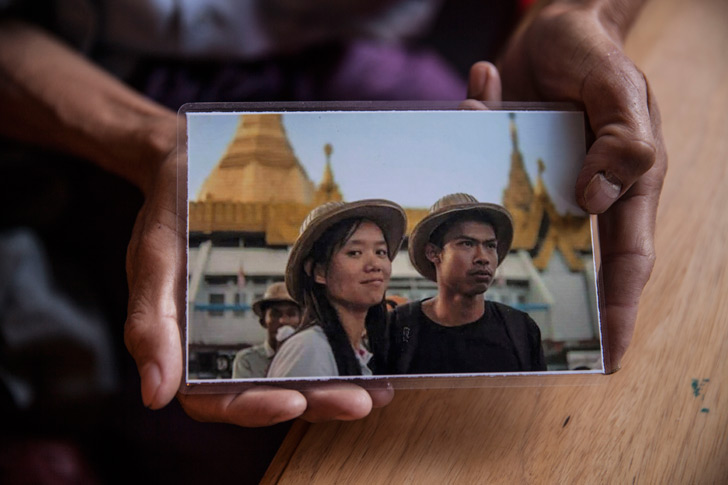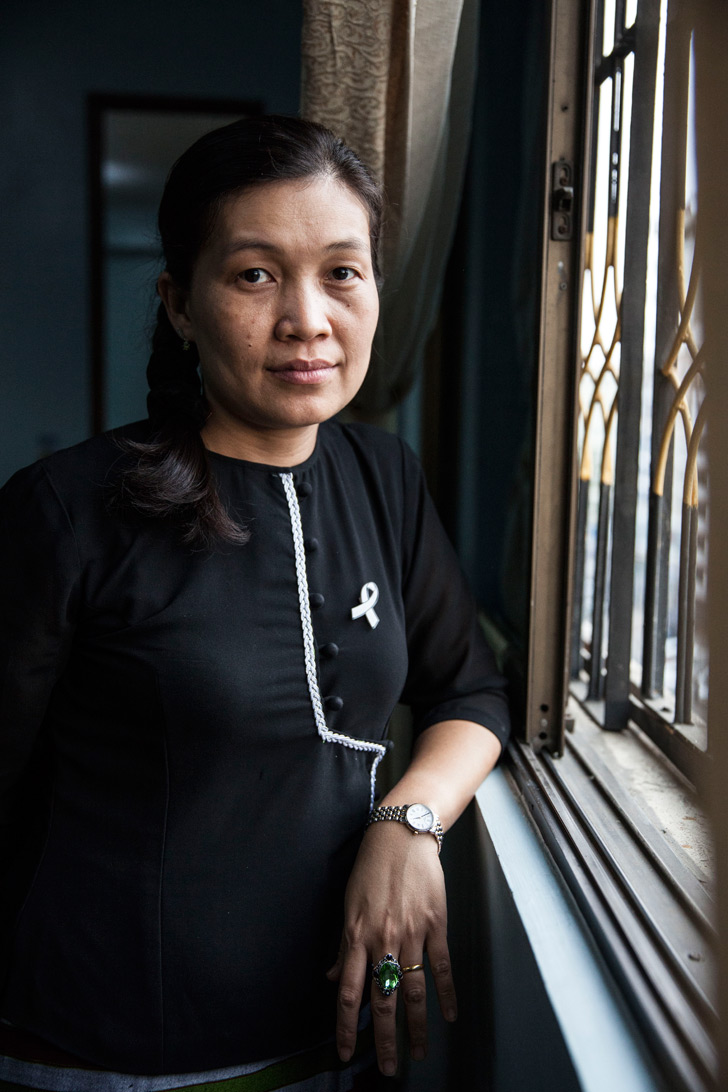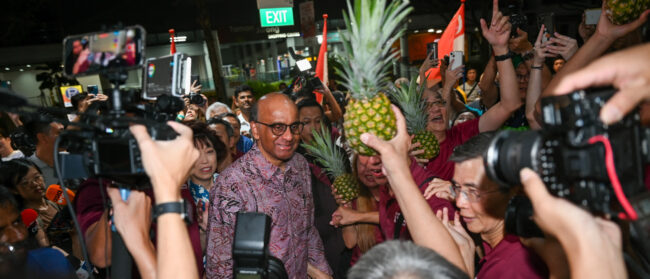Sitting in Yangon’s Black Star Café, Nay Win pulled out stacks upon stacks of newspapers containing stories on his beloved daughter, Phyoe Phyoe Aung. “I have nearly every article printed about her in Myanmar,” he said. Just when it seemed the pile had finished growing, he produced reams of treasured family photographs. Phyoe Aung as a child; with teenage friends; after a meditation session; at her wedding to Lin Htet Naing, a fellow student activist.

Both Phyoe Aung and Htet Naing, who goes by the name James, were arrested while demonstrating for education reform in Letpadan, in Myanmar’s Bago region, one year ago. Since 10 March 2015, while Myanmar has been going through its celebrated transition from civilian military government to ostensible democracy, the pair, along with more than 50 other student protesters, have been held in Thayawaddy prison. Every week the young activists appear at scheduled court hearings and, outside, family members await them with words of support and bowls of food to supplement their meagre prison rations.
“I always go to court and see her every week,” said Nay Win, himself a former prisoner of the military regime. “Now, in total, it’s been 35 weeks, and I will continue doing this.”
In January last year, the students began a march from Mandalay to Yangon to show their opposition to a new national education law that centralises control of higher education. Calling for more power to be given to universities, the right to form student unions and the teaching of classes in ethnic minority languages, the students’ march initially lacked official approval, making it technically illegal.
However, buoyed by positive negotiations with the authorities, who agreed to allow them to pass freely to Yangon, the protesters set off. Just 140km north of their destination, they clashed with police in Letpadan, and more than 120 students were detained in a violent crackdown.
“They’re still suffering. They were beaten up and they were tortured and they were arrested, so they’re still suffering physically,” said renowned human rights lawyer Robert Sann Aung, who is representing 69 accused students, 53 of whom are still in detention. “Mentally, also, they are suffering. They are feeling like they were really violated, but they are not receiving medical treatment.”
According to a joint report released in December by three groups – the Justice Trust, the Letpadan Justice Committee and the All Burma Federation of Student Unions (ABFSU), which counts a number of its members among the jailed – 70% of the student protestors were injured in the violent clash.
Several of the detainees developed serious health issues while in jail, such as tuberculosis, gastro and kidney problems, while others suffer from pre-existing conditions including heart problems and severe migraines. All, the report said, had been denied adequate medical care.

“They’re still suffering. They were beaten up and they were tortured and they were arrested, so they’re still suffering physically”
ROBERT SANN AUNG, HUMAN RIGHTS LAWYER
As their trial for charges including unlawful assembly and rioting drags on, some student leaders have seen their charges continue to pile up. As recently as last month, Phyoe Aung, who is the secretary general of the ABFSU, told the Irrawaddy magazine that she had received five additional summonses from courts in Yangon and was now facing charges in more than 30 cases.
“The charges are very unjust, unfair,” Sann Aung said. “The government had already agreed that they were not going to take action against these students. After the government promised that, they took violent action… This is very bad.”
Sann Aung said the decision by the government to go back on promises made during the negotiations was significant. “This case is really different [to other cases I’ve worked on]… This is a violation committed by the government, so legally this is very unique.”
In the months and weeks leading up to the election, scores of activists were rounded up and arrested. As Myanmar went to the polls, more than 100 ‘prisoners of conscience’ were behind bars, according to Amnesty International, but media attention was firmly fixed on a blossoming of democracy in the former pariah state, as Aung San Suu Kyi and her National League for Democracy (NLD) party soared to victory.
A prisoner amnesty in late January, which saw the release of 102 prisoners, won praise for President Thein Sein’s outgoing government. Among them was British/New Zealand citizen Philip Blackwood, a bar manager sentenced along with two Myanmar colleagues to two-and-a-half years in jail for “insulting religion” after using a psychedelic image of Buddha wearing headphones to promote a club night, and 13 people from a community in Yangon who were sentenced at the end of 2015 to seven months for protesting over a land dispute.
In the hype that followed, many overlooked the dozens still in jail. Laura Haigh, Amnesty International’s Myanmar researcher, said that only 16 prisoners who the organisation had campaigned for were released, and hundreds of peaceful activists remained on bail awaiting trial.
“It’s heartening that the men and women released today can go back to their lives and families but, the fact is, none of them should have been charged in the first place,” she said at the time, adding that, “if President Thein Sein is serious about leaving a positive legacy he must clear the country’s jails of all prisoners of conscience once and for all.”
The NLD has made clear that it plans to make the release of political prisoners an early priority of the new government, which is due to be formed by 1 April. And with former political prisoners making up 115 of the NLD’s new lawmakers, it is little wonder. However, after decades of entrenched junta rule and with the military retaining control of three key ministries – defence, border affairs, home affairs – as well as a judiciary plagued by a lack of independence, there are no guarantees of military non-interference.
Under the constitution, drafted by the military, its commander-in-chief is able to take over the country in the event of an unspecified ‘emergency’, while any changes to the constitution will require the assent of the army, for which one quarter of seats in the new parliament are reserved.
On the very day of the prisoner amnesty, a guilty verdict in another case highlighted the military’s enduring dominance. Peace activist Patrick Kum Jaa Lee was sentenced to six months in prison for “online defamation” after being arrested in October 2015 over a Facebook post that depicted a foot stepping on a photo of Myanmar’s powerful army commander, Senior General Min Aung Hlaing.
“Despite the optimism around the recent elections, today’s verdict is also a clear reminder that peacefully criticising the military is still very much off limits in Myanmar,” Amnesty’s Haigh said. “The new government, which is meant to take power at the end of March, must do much more to ensure full respect for the human right to freedom of expression.”
Speaking at her office in central Yangon the day before the verdict against Jaa Lee, his wife, May Sabe Phyu, said there was a bitter irony in the sentence: her husband, she said, had not even posted the photo, but instead commented underneath a friend’s post warning of the dangers of sharing such images of high-level military officials.
“Now it is already 95 days that he has been in prison,” she said. “He has severe asthma, and since his arrest he has suffered from high blood pressure. Several times I have appealed to the court.” Sabe Phyu, herself a prominent women’s rights activist, has also written entreating letters to government ministries and ministers, international diplomats, human rights organisations and even to the army commander himself.

When a high-profile individual pours all their resources into a case, garnering widespread attention, yet it is still ignored, there is a clear message in play: don’t mess with the military. “This is a big signal that they will not listen if you touch the military. If you dare touch the military, this is what happens,” Sabe Phyu said. They have chosen to make an example out of Jaa Lee, she believes, a decision partly motivated by the fact that he is a member of the Kachin ethnic minority. Ethnic minorities have long faced persecution and discrimination in Myanmar.
Asked about the impact of Jaa Lee’s arrest on her family, emotion briefly in her face, but she remained resolute. Raising their three children alone while caring for her husband’s elderly mother and juggling her many work commitments, she explained evenly, means that Lee’s arrest has had a major impact on her life. “Normally, I’m really busy, so arresting him and putting him into prison has stopped a lot of my work. I’m not about to travel or work fully on issues – I have to spend a lot of time, money and energy at the court or at the prison. He works as a humanitarian… doing a lot of very meaningful work that was contributing to society.”
Clearly, though, the situation in Myanmar is changing fast. With intense domestic and international pressure on the government, there is every possibility that Phyoe Aung, Jaa Lee and others could be released after Southeast Asia Globe goes to print. But many remain cautious about the outlook for political prisoners, and human rights more generally, after the NLD takes power.
Sabe Phyu said that, despite her high hopes for the new government, she has mixed feelings about what the NLD can achieve while suspicions about the military’s willingness to cede power remain. “Because 25% are military in the parliament, they will strongly resist changing or amending the constitution in any way. Also, the military is still having absolute power… What is the point of the role of president and the parliament? In the past five years, we clearly saw that the parliament and the president have less power to control the military, and unless we’re able to change the constitution this will stay the same.”
Sann Aung agreed that there is a long way to go before Myanmar can be called a true democracy. “This is a sugar-coated democracy, not a real democracy,” he said of the civilian-led military government headed by Thein Sein. And what of Myanmar’s democratic credentials after power is handed to the NLD at the end of this month? “It’s going to be a three-quarters democracy.”


